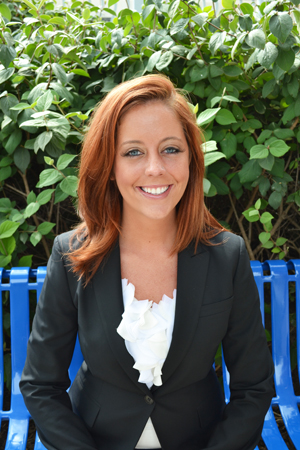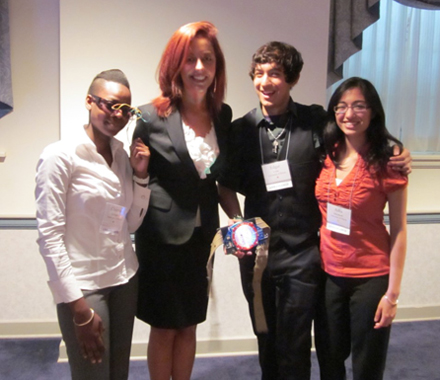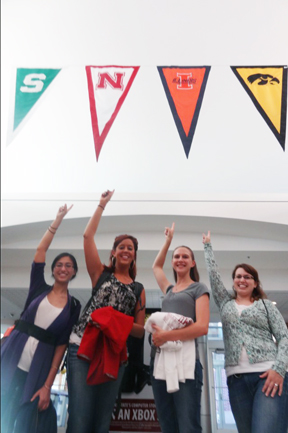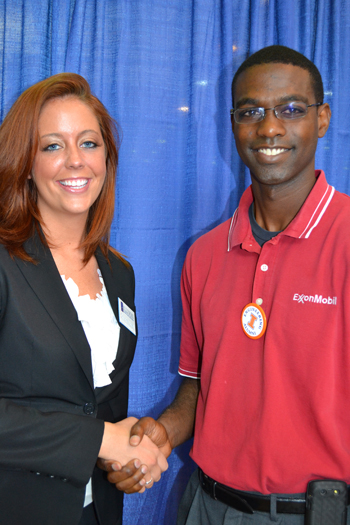MechSE Senior Christine Littrell Poised to Change the World

MechSE senior Christine Littrell
November 5, 2012
"Frankly, she's just a tremendous advocate for the department. She is one heck of a good ambassador for us." Bob Coverdill
What was it that first made Christine Littrell stand out from the crowd as a freshman, besides her stunning, could-have-been-a-model good looks? According to Bob Coverdill, Director of Advancement for Mechanical Science and Engineering (MechSE), she always wore purple—and had a matching purple laptop to boot.
Now that senior Littrell has had four years to grow and carve out her own not-so-little niche in the College of Engineering, there's a whole lot more to her than the color purple. For example, one of her most recent achievements was being named a 2013 Knight of St. Patrick by the College.
Looking back over her career at Illinois, Littrell emphasizes the importance of getting involved. She reports that the first thing she did as a freshman was to participate in the WIE (Women in Engineering) camp, which she calls helpful. "It definitely is weird to say that all of my best friends now, I met there at WIE camp. A lot of the ones that have stuck together and made it through engineering, you meet them there or the first couple days of class, and you just build a network and the ecosystem that you're all going to survive."
She also recommends involvement in societies and student organizations, partly for the mentoring aspect:
"I think that it was strategic in the beginning to get involved with the societies and, obviously, just to become a member. Definitely at that time as an underclassman, you connect with the upperclassmen who then kind of show you the ropes. And they hope that you pass those ropes on to someone else someday."

Christine Littrell (second from left) poses with the other Illinois engineering students who attended the Engineering Ambassadors Workshop.
And as an upperclassman, she has definitely "passed the ropes on." In a trip to the Engineering Ambassadors Conference at Penn State last fall, she mentored the three underclassmen who attended, holding mandatory meetings every night after the activities so they would retain all they had learned that day. "I felt like a sophomore, as if I were in their shoes. I would have been like, 'Oh, this is great!' but I would have been lost. Not lost, but it takes a little bit of time and maturing to learn how to professionally recognize and take in information."
Coverdill heard via the grapevine about Christine's taking the underclassmen under her wing. "Her experience there was just nothing short of phenomenal. What I heard after they came back was about her leadership, even at the end of each day, talking with the younger students that went and kind of mentoring them. She's all of two years older than them, but she just seems to be so much more mature and confident than her age and tenure in school would suggest."
Jenny Ehrnthaller, formerly the Academic Advisor and Program Coordinator for MechSE and currently the Associate Director of Engineering Career Services, reports that she "really got to know" Littrell during the trip to Engineering Ambassadors.

Left to right: Asha Kirchhoff, Christine Littrell, Jenny Ehrnthaller, and Jenny Amos point to the Illinois banner during the Engineering Ambassadors Conference at Penn State (photo courtesy of Leslie Srajek).
"Throughout the Engineering Ambassador training, I was able to see Christine present, which showed me her technical capabilities on top of her being this amazing person who handles so many extracurricular activities; and I just know she's going to be so successful. We were kind of joking, but one of the things she told me during the trip made me smile. We were on a tour of Penn State campus, and we came up to this beautiful house, and Christine said, 'One day I'm going to have a house like this when I'm a CEO of a major company, and I'll be sure, Jenny, to call you up, and you can come out and visit me, and we'll have tea.'" And Ehrnthaller has penciled the appointment in on her calendar. "I know it's going to happen; I can count on it."
A member of the American Society of Mechanical Engineer's (ASME) student chapter since her freshman year, Littrell has been president two years running.
According to Coverdill, who has had many opportunities to interact with Littrell during her two-year stint as president, "She just seems to have this very strong leadership style about her; she takes charge of things; she's got a confidence level that seems much higher than a typical student."
For example, Coverdill reports that Littrell effected a paradigm shift in the way ASME schedules guest speakers. Not only did she recruit exceptional speakers, but, recognizing that the speaker from "XYZ Corp" was often coming to recruit students, she made it into a fund-raising event, so it's mutually beneficial to both parties. Now, for the privilege of speaking to (and possibly recruiting) some of tomorrow's leading engineers, speakers not only make a contribution to ASME, but, more importantly, they spring for the pizza.
No task is too daunting for Littrell to tackle. During her career at Illinois, the MechSE senior has served as the head ELA (Engineering Learing Assistant) for Engineering 100, the beginning engineering course for freshmen. The head ELA, in essence, runs the course, training the ELA students to run the sections and working with the departments.
According to Ehrnthaller, Littrell also worked her magic at a recent Engineering Open House. Engineering had initiated a new program for prospective students, where each department could come and showcase their majors and activities. So in a very Littrell-esque move, the intrepeid leader volunteered ASME to coordinate it then took charge, designing the poster and scheduling ASME students to staff the orange-and-blue-balloon covered booth.
Littrell has also devoted a great deal of time to the Hoeft Technology and Management Program (T & M), which the senior calls "one my biggest joys here at University." T & M is comprised of engineering and business students who are pursuing a Technology and Management minor. According to Littrell, all engineers take business courses "with an engineering twist," to see how the business world and engineering world interact. "The business people will then learn different aspects of engineering, and then we also have combined courses where we all work together. It just helps." As an aside, she admits, "I think it also adds some relief to my schedule—not so many hardcore engineering courses."

Christine Littrell outside the ARC during an Engineering Jobs Fair in the fall of 2012.
In a recent letter of recommendation that Ehrnthaller wrote for Littrell, she called her "one of the most outstanding undergraduate students that I've had the pleasure of working with during my years in the Department of Mechanical Science and Engineering. She's not only an excellent student academically, but she also has an exceptional ability to remain successful in many additional extracurricular activities that require much time and effort." Ehrnthaller added, "I think that kind of just sums it up. Her GPA is amazing, and it's really not an easy task for a Mechanical Engineering student here at Illinois—one of the top programs in the nation—to do that…She's just phenomenal. She holds it all together. She never looks stressed. She's beautiful—her eccentric looks. It's just amazing."
When it comes to Littrell's GPA, her mother, who was a recruiter for a while (both of her parents were engineers), told her this about the hiring process: "I will never look at your GPA; if you have a conversation, and you can tell me why you think you deserve this spot more than anyone else; that's what gets you the job." However, Christine evidently disregarded Mamma's advice, figuring a 3.9 GPA can't hurt.
Regarding her appearance, Littrell is quick to qualify that although she doesn't look like the stereotypical engineer, she has received lots of support on campus: "I know I'm not the typical engineer. I know that I don't come across, and I don't have those inherent traits that you would think of when most people think of the general body of engineers. I think that Illinois has done a great job of letting me be myself but still be a great part of this college and a great part of the MechSE department."
Her plans for the future? "I'm excited for the future. I think I've had some great experiences, but I think that the best is yet to come. I like to see what people do when they graduate: this is just the starting block."

Christine Littrell and recruiter from ExxonMobile during recent Engineering Jobs Fair on campus.
As a senior, she has a couple of job offers on the table, but hasn't written off returning to school: "My career goals? Um, I know I'm not done with school, as much as I want to—as much as I'm excited to graduate." Whether it's now or later, Littrell has lofty goals: "I know that there is a bigger picture, and I definitely think that I want to make an impact, in some form, on the Engineering Grand Challenges. Right now I'm steadfast on the energy department, so really working with alternative energy and trying to find new ways to make the world work."
If and when she returns to school, will it be at Illinois? "I have no idea! Obviously, Urbana-Champaign has its charm!"
Like many others in the College, Coverdill plans to keep an eye on Littrell's career down the road. "I just think that Christine has a tremendously bright future ahead of her. I would frankly be surprised, in some ways, if she ends up doing what I'll call a traditional career. She's got very special traits and characteristics that, while she'll be a very successful engineer—I've no doubt about that—I think that she will quickly be recognized, wherever she ends up, as somebody that can do far more than be an engineer, and whether that's in outreach, or advocacy, or leadership, it's going to be fun to watch. We're obviously exceedingly proud of her."
What does Ernthaller envision for Christine (besides being a CEO with an incredible house)? "Christine's goals are so high, but I can just tell from how she's handled everything that's gone on here at the University, that whatever goal she does put in front of her, she will achieve."
It is students like Littrell that make Ehrnthaller's job rewarding. "She's one of those students that makes you feel so fulfilled with your job. This is why I do what I do, because of the opportunity to meet students like Christine."
Ironically, in an interesting role reversal, Ehrnthaller admits that Christine has been a mentor to her too. On hearing that Ehrnthaller was thinking about applying for a job in Engineering Career Services, Christine advised, "Oh, I think you should go for it." She agreed to serve as reference, then gave Ehrnthaller a glowing recommendation when contacted. "So she helped me advance in my career too," acknowledges Ehrnthaller, "even though I was her academic advisor."
As a woman in engineering, much of what Littrell has achieved flies in the face of the "traditional" mindset that women don't belong in engineering. In fact, to combat this mindset, Littrell proactively tired to organize a Women in Engineering Forum. "The cold, cruel fact is, mechanical engineering—in fact, most of engineering—still is a very male-dominated world," admits Coverdill, discussing Littrell's dream of addressing this issue. "Some company cultures are not even real welcoming to women in engineering…the culture is such that it tends to be a guys' domain. So I really appreciated that Christine worked on this."
Despite the opinion of some that women aren't cut out to be engineers, Christine finds engineering rewarding and believes she has found her niche. "I'm glad that I stuck to my gut. I could have taken what people said to heart and run with it, and been like, 'Maybe this isn't for me… But, I'm glad that I stuck with it. I knew that I wanted to be in engineering, and I knew that I wanted to do this, and that in the inner-core of myself, that's what I was meant to do."
Coverdill believes Littrell has left a legacy that will inspire other students to emulate her as a role model. "The example that she's shown for other students is just phenomenal. By seeing what she's been able to do, I'm sure there are younger students going, "Heck, I can do that!"
For students intent on following in Littrell's footsteps, Ehrnthaller has discovered the senior's formula. Curious as to how Littrell has been able to accomplish so much over her four years here at Illinois, Ehrnthaller asked her once how she does it. Littrell's reply: "Oh...I just don't sleep, Jenny."
Story and photographs by Elizabeth Innes, Communications Specialist, I-STEM Education Initiative
More: MechSE, Student Spotlight, Women in STEM, 2012













.jpg)
















